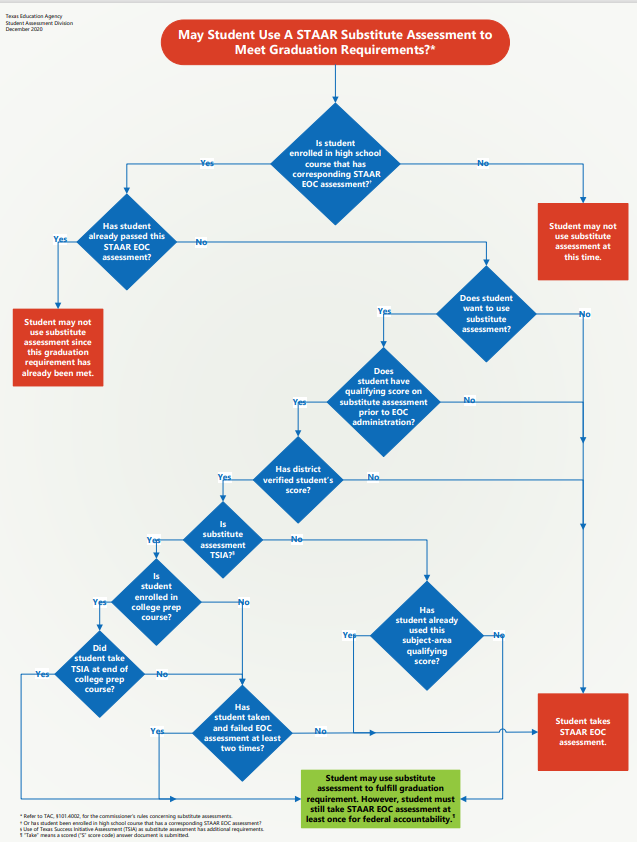STAAR (State of Texas Assessment of Academic Readiness)

If your child is in grades 3-8, your child will take the STAAR test for his/her respective grade level.
If your child is in grade 9-12, he/she will take STAAR End of Course exams for the specific courses they are taking. To understand how passing End of Course tests impact graduation – See Graduation Options.
At each ARD meeting, the ARD committee (which includes parents) discusses
- how your child accesses grade level curriculum for each subject tested and
- the statewide assessment options for the student.
It is expected that the ARD committee always considers the STAAR, with approved or allowable accommodations (as outlined in the Accommodation Resources), as the first option when making assessment decisions. Accommodations can be provided to students who meet the established eligibility criteria for a specific accommodation and:
- Receive special education services,
- Receive 504 services, or
- Have a disabling condition and do not receive 504 or special education services.
To learn more about the STAAR tests, parents should review the STAAR Specific Resources. By reviewing the resources, parents may find it easier to determine which test is appropriate for their child, as well as help them develop possible IEP goals. These resources show:
- what students are required to know at each grade level (the curriculum or TEKS),
- why the TEKS objective is tested,
- the number of items tested under each TEKS objective, and
- examples (released test items) of how those expectations are met/tested.
STAAR Alternate 2 and Exceptions
If the ARD committee determines that STAAR is not appropriate, they must use the state-required Participation Requirement forms for STAAR Alternate 2 to document their decisions within the IEP.
For some students, even the STAAR Alternate 2 may not be the right choice. There are two exceptions available.
What are the options for a student who speaks a language other than English?
STAAR Spanish is available in grades 3-5 in mathematics, reading language arts, and science. All English Language learners should be assessed annually using TELPAS to see if they have met English language proficiency.
In addition, for students that speak other languages and receive special education services, the LPAC is responsible for working in conjunction with the student’s admission, review, and dismissal (ARD) committee to make and document assessment participation decision. Children should be evaluated relative to how well they are able to understand and use English to access the general curriculum at their enrolled grade level in accordance with their individualized education program (IEP).
Participation must be considered on a domain-by-domain basis. The reason for not assessing the student must be well-supported and documented appropriately in the student’s permanent record file by the LPAC.
With rare exceptions, students should be able to be observed and rated meaningfully in each holistically rated domain. If the LPAC and ARD committee collaboratively decide that an assessment is inappropriate because of a student’s particular disability, the decision is recorded at the time of testing, and the student is not holistically rated in the applicable domain. This non-participation decision is applicable only for a student receiving special education services who is not eligible for TELPAS Alternate.
What Parents Need To Know
Do you feel totally confused about which assessment your child should take? If you do not understand the implications of your choices, know that you are like any other parent of a child receiving special education services. Even though parents are all in the same predicament, we still have to make educated decisions.
So ask questions of school personnel that will help you learn about the options. Consider spending some time on the Student Assessment Division website at TEA. Prior to attending your ARD meeting, find out what the latest changes are before you make decisions that will affect your child. Remember, these assessment decisions may affect your child’s future graduation options when he or she is in high school.
Additional Resources:
Region 4 Education Service Center – STAAR ALT 2 Instructional Decision Making Guides The guides are provided for the subjects and grades assessed with the STAAR Alternate 2
Texas Project FIRST:




